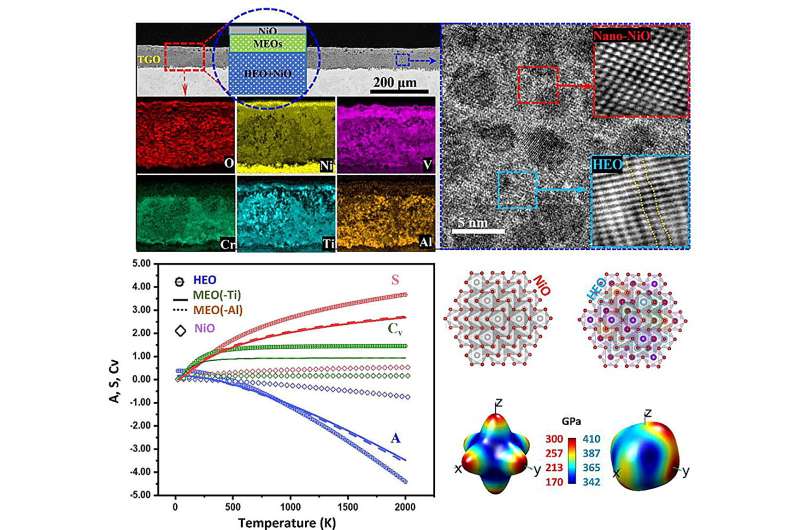
An engineering research team at the University of Alberta has identified a new material for coatings that offers promise for high-temperature applications like hydrogen combustion engines.
The coating is made from a new super alloy composed of metals such as aluminum and nickel. Known as a complex concentrated alloy, the new material is ideal for coating surfaces that must withstand high temperatures, such as in gas turbines, power stations, vehicle and airplane engines.
The newly developed alloy—AlCrTiVNi5—has superior thermomechanical properties that include high stability, low expansion, fracture tolerance, and a valuable combination of strength and ductility—which make it able to stand up in high-heat and high-pressure environments.
The study, "A novel entropy-stabilized oxide coating thermally grown from a valve metal-based complex concentrated alloy," is published in Materials Today.
When compared with existing commercially available alloys used as coatings in high-temperature applications, the new coating material stands up better than anything else, according to project supervisor Jing Liu, assistant professor in the Department of Chemical and Materials Engineering. It could prove important for use in hydrogen engines.

Hydrogen is considered one of the cleanest sources of energy, as it produces only water when it is burned or used in a fuel cell. It plays an important role in Canada and Alberta's emissions reduction goals, for a range of uses including transportation, home heating and heavy industry.
But one of the challenges of hydrogen adoption is the high temperature at which it burns, ranging from 600°C to 1500°C. These extreme temperatures mean that any mechanical components involved in hydrogen combustion must be able to withstand high heat as well as resist corrosion from steam.
"If you would like to use a 100% hydrogen fuel combustion engine, the flame temperature is extremely high," Liu says. "Until now, none of the existing metallic coatings have been able to work in a 100% hydrogen combustion engine."
Currently, most hydrogen combustion engines in commercial applications run on a mix of fuels—natural gas and hydrogen, or diesel and hydrogen, for instance—but as more industries work to adopt hydrogen as a primary fuel source, Liu sees a need to prepare for the ultra-high temperature conditions of a fully hydrogen-fueled engine.
"As we move toward a 100% hydrogen combustion engine, we want to know which alloys can withstand the conditions. None of the existing ones did, but we learn valuable insights from these failures," she says.
The research team identified the strengths and weaknesses of each existing commercially available alloy, then used theoretical simulations to identify potential new combinations that might have the strength and durability they were looking for. Working with colleagues like Hao Zhang in the Faculty of Engineering, the team used computer modeling to understand the properties of each potential new alloy.
More information: Meifeng Li et al, A novel entropy-stabilized oxide coating thermally grown from a valve metal-based complex concentrated alloy, Materials Today (2024). DOI: 10.1016/j.mattod.2024.02.005
Citation: Engineers create complex concentrated alloy for use as a high-temperature coating for hydrogen combustion engines (2024, June 5) retrieved 5 June 2024 from https://techxplore.com/news/2024-06-complex-alloy-high-temperature-coating.html
This document is subject to copyright. Apart from any fair dealing for the purpose of private study or research, no part may be reproduced without the written permission. The content is provided for information purposes only.
